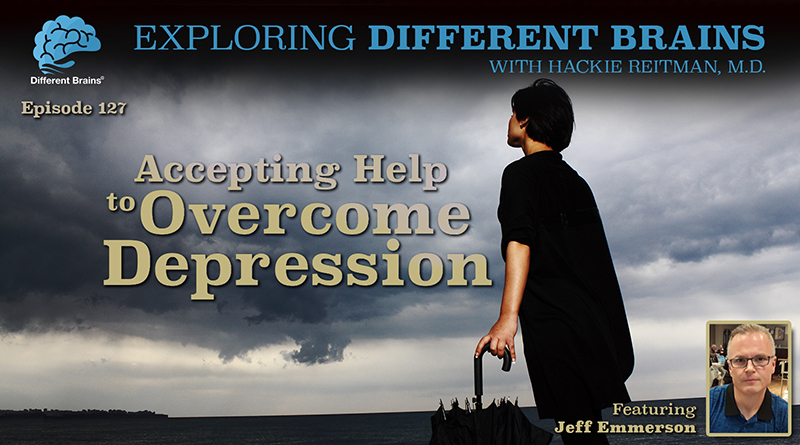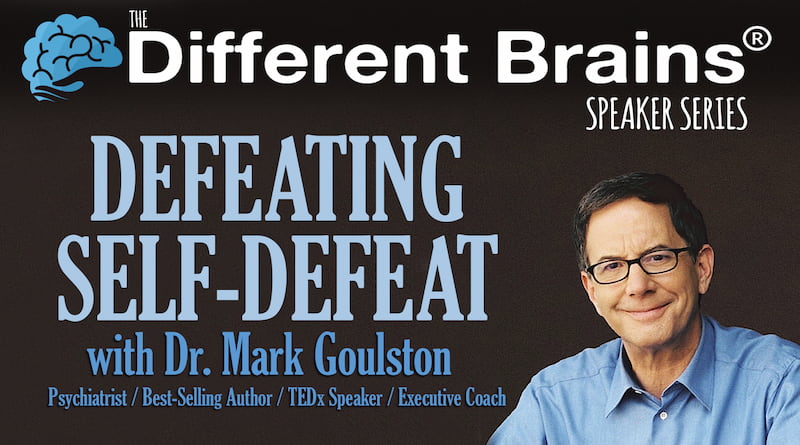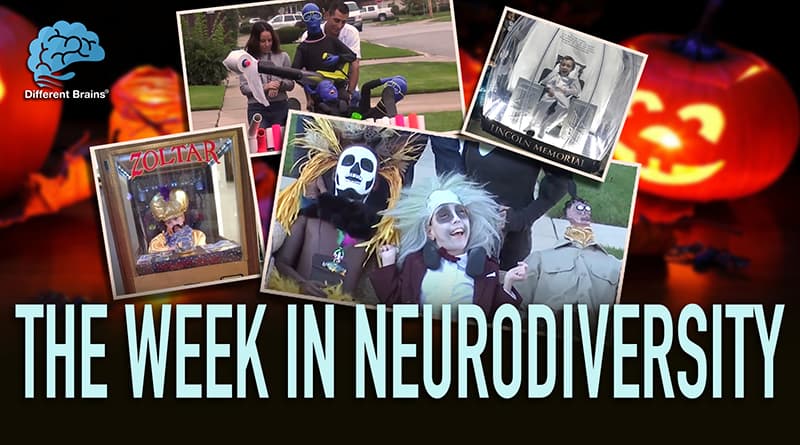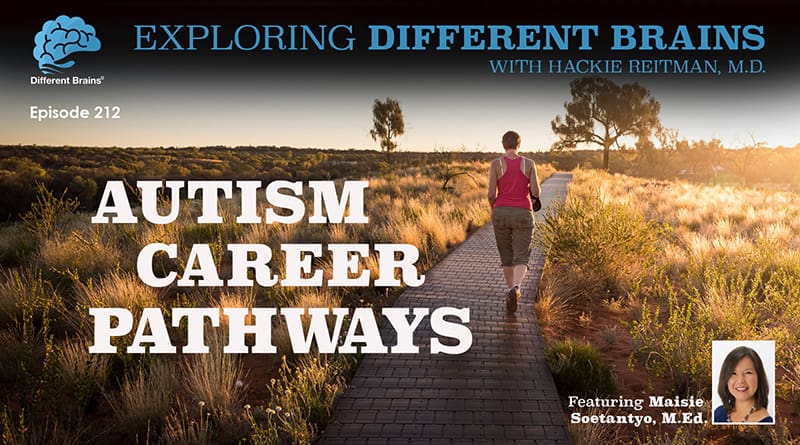
Accepting Help to Overcome Depression, with Jeff Emmerson | EDB 127
(24 mins) In this episode, Dr. Hackie Reitman speaks with Jeff Emmerson. Jeff is co-author of the book Beyond ADHD, and speaks around the world advocating for mental health, suicide prevention, anxiety, depression and ADHD. Jeff discusses his battles with depression and suicidal thoughts, the overlap of mental health and ADHD, and the importance of accepting help.
For more about Jeff Emmerson, visit: https://jeffemmerson.com/ and on his social media:
Facebook: https://www.facebook.com/IAmJeffEmmerson/
Twitter: https://twitter.com/IAmJeffEmmerson
LinkedIn: https://ca.linkedin.com/pub/jeff-emmerson/ba/129/90
Instagram: https://www.instagram.com/iamjeffemmerson/
.
41 Second Preview:
.
To listen or download the podcast version of this episode, see the embedded player below.
Or look for us on your favorite podcast provider:
iTunes | Stitcher | SoundCloud
[expand title=”View Full Transcript”]
HACKIE REITMAN, M.D. (HR): Hi I’m Dr. Hackie Reitman, Welcome to another episode of Exploring Different Brains. This time we have a popular guy on for this episode of Exploring Different Brains. And we’re gonna be talking to Jeff Emmerson who’s a mental health advocate, public speaker, author, and he’s got one of the largest social media followings out of anybody in the mental health arena. We’re gonna hear all about his incredible story today. Jeff welcome to Exploring Different Brains.
JEFF EMMERSON (JE): Thank you for having me Hackie it’s a pleasure and honor to be here, to be able to share with you. I appreciate it.
HR: Well why don’t you introduce yourself to our audience.
JE: Sure. My name’s Jeff Emmerson as mentioned and I’m a guy who essentially has been in and out of the mental health system as an adult starting at the age of about 33-34 roughly. And from that coming out the other side I decided essentially to write a book. I wanted to speak out about it and like a lot of other people out there I wanted to see what I could do to not only share my story but also, you know the cliche term, help others. One or two people out there whoever it might be. It’s built into this giving me new purpose ironically and I’m just going all in on it now and seeing what can manifest from it.
HR: Alright so, tell us the story of how you got into it.
JE: Do you mean after my own struggles or before it began? Just wondering.
HR: Well you went through a long haul in order for you to get your diagnosis. Tell us about your diagnosis and the path to getting your diagnosis.
JE: Yeah it’s interesting and was a major driving force in why I wrote the book at least the first book. I have to remember it all obviously. But going back it all really came down to having a few you know checklist type tests from the DSM and others to rule out things like bipolar disorders one and two’s 2:27.22, hypomania, anxiety disorders, and several others. Acute and chronic depression and other things. And what we, the way it culminated, I guess to make a long story short, is that through all those tests and things, basically the, I call it the label sometimes, but the diagnosis of ADHD was the one we went with. And I know that kind of sounds perhaps a bit shaudy, if you will. I remembered to this day when it was almost suggested to me that well maybe it’s ADHD Let’s go with that. Let’s see how medication works for it. And certainly you know by well meaning people and you know all that stuff. You know people did their best to try and rule things out. From childhood trauma to other things, diet, nutrition, exercise, all that stuff. Trying to look at my overall life from a wholistic perspective. And I didn’t know any better myself at the time, so I thought well okay I’ll go along with this ADHD diagnosis, and it seemed at first Hackie to be an overwhelming sigh of relief. Because at least I knew because I’ve heard others say, It’s like a weight was lifted. There was some explanation into why you know a lot of my past happened like it did. Not as a crutch obviously but anything like that. As somebody who’s very driven but couldn’t seem to convert that to success in any given area. So yeah long story short, we went with that diagnosis. I remember researching some medications at the time trying to figure out what might be, you know maybe some more modern, cleaner I remember it was a term we used, medications that again I, not being the Doctor myself I’m no expert there but Adderall vs. Ritalin sorta thing and some others we were looking at. Essentially all I did was go on Adderall for about 6-7 weeks roughly. And that was it. And I noticed absolutely zero change, I think I was on maybe two dosages at the time. So again I noticed somewhat crude but looking back, you know and it was like a shot in the dark, something while on that medication, speaking with my wife at the time, I realized I’m not really noticing much. Is this really supposed to help solve things. Obviously I was completely green, so from that, it started the whole journey Hackie into questioning my diagnosis and digging deeper.
HR: What were your biggest behavioral features that you recall back then?
JE: Certainly a huge one has been, obviously very driven but you know going, saying I’m gonna do something, right I’m gonna pursue a goal, let’s say university, college at one point. Very high expectations, very high drive, and that sort of thing. But then for some reason and this was such a huge frustration for me, and gradually broke me down, but I remember the determination, the desire, and the words weren’t backed up with my actions. So what would happen is I would realize the work it would actually take to achieve a goal, even though I knew intellectually, a masters degree or something else, it’s in steps. You know it’s not obviously some 6:08:00 vision, like tomorrow I’m gonna achieve it. I knew there were steps. But it was very driven and all that stuff, like I’ve said, but along the way I found out I was easily bored and lost interest through, just the way that my mind would form a pattern, thought patterns I had. In one way or another I would find a reason like in university for instance, it was textbooks. I found I’m more of an auditory learner more kinestetic, meaning I just need to try stuff, I need to be able to be out there. I’m not easily able, and also with a bit a vision issue that I have. Not a bit of one, but an actual vision issue. We discovered a couple years ago with an optomologist. That also helped point out in hindsight that reading and trying to study was futile for me. I began to do, you know on one hand I was already in research, in year one of my honors program. Yet on the other, when it came to other classes I was a bored and extremely bored, and I thought, let me just get to the good stuff, if you will. You know later on where it’s more self directed and I can really show my strengths, I thought, as naieve as that might sound. But number 2 the vision issues, were, it was almost like sabotage, so driven to do something and so inspired and yet, not doing well at it, and it was like apposing forces in my head. I hope that explains a bit that uh.
HR: Then when you hit your crisis stage you had the courage to check yourself into a facility. Tell us about the crisis and tell us about checking yourself into a facility?
JE: Sure. I can actually do that chronologically, too, if that benefits anyone out there to show the story for anyone going through things. Quick reference: in 2008, on a separate note, I have a brother who committed suicide. That’s obviously another topic. That had happened and I never spoke to anyone about that, so throughout this university issue, which was around 2009 or 2010, I was dealing with that, but also dealing with this stuff that I just mentioned about myself. 2010 was the first time I actually went – it wasn’t a facility yet; it was a clinic – to try a medication. I was put on one medication, Zoloft. It didn’t help at all, and I just continued on. Fast forward to 2011, I actually then had a suicide attempt. Still hadn’t checked myself into a facility, but at that time, after the attempt, I effectively stopped in the middle of it, walked upstairs, and told my wife I needed to go to the hospital. So that’s where it really began for me as far as getting into the emergency room. That was roughly late August 2011, and then January of 2013 is when I committed myself from fresh depression and suicidal thoughts that had come back. January 2013, we went back to the hospital, and I remember signing the papers with my wife to be put under reform to voluntarily commit myself, and my wife crying, and me as a husband feeling about that big as I say. Pride was shot and all that stuff. In hindsight, it was certainly one of the best things I’ve ever done, though one of the scariest. Ironically, speaking about my brother earlier on, he had been in that very psych ward or mental health unit before he passed away, so it was a whole mixed thing with my wife visiting, my dad visiting, and seeing my brother’s room where he had been before he passed away. That was a whole lot there, but again, in hindsight, one of the best decisions I’ve every done.
HR: Now, here at Different Brains, what we try to do is to learn and teach positive tools for people to use. Now, someone who’s watching this who might be going through a depression or has other stuff going on, what advice would you give them?
JE: Obviously it’s case by case. On Twitter, I certainly try to say that I don’t have a cookie cutter answer of course, but what I would say is that for me, because I’ve been there, the worst moments and the worst struggles taught me, ironically, the greatest strength is resilience, almost like baptism by fire. They taught me to; they forced me. You’re either going to go all in and figure this stuff out, or else it’s obviously a much darker choice. I chose the former, fortunately. I would say number 1: be, and again I can only offer this from the heart, be gentle on yourself no matter what’s going on around you; it’s a huge thing, I think. I would always get into the racing, high expectation, high anxiety mindset, and self sabotage, in hindsight. I would say you’re not alone definitely in this stuff. You can go, remember I was 35 at the time, age, regardless of if I was 70 or 12 or whatever, you can overcome; you can change the future. For now, be gentle on yourself. Don’t rush it. I’ll finish with this: Like my wife said, it’s ok to wave the white flag and allow someone else to help you. Again, the best thing I could have done, and that’s why I’m here on this mission today. Hope that helps.
HR: That’s great, and we’re glad you are. Thank you for helping and inspiring us to do our best. How do you see the overlap or the interrelationship between ADHD and depression in your case?
JE: Obviously, I can only speak from my own experience, but I see them as, in my head, being a sort of whiteboard guy or idea person, I see the linkages, the mind map. One can lead to the other. The mind racing, the anxiety, the racing thoughts, or inattention. Whether it’s inattentive ADD or the hyperactive ADHD or somewhere in the middle, I realize that depending on one’s, whether it’s school, their life, their home life, their social life, their sense of self without getting too deep. It depends how they are positioned, supported. Self awareness is huge. If you’re on this, I don’t like the word spectrum, but for this case, I’ll say if there are any issues with attention, that can definitely drive perfectionism, self doubt, all these things, feeling very small about ourselves, because on one hand, whether you’re like me, very determined and sometimes hyper and about sports and all that stuff, or if you’re completely the opposite, more inattentive and maybe more inward, we all have self doubt. I think across the board we all have hopes, goals, all these things, but I want people to know that anxiety, obviously, which is partially a normal thing, something that can be useful, can also be self sabotaging and to learn coping strategies. Obviously, medication, of course, is an option as well, potentially as part of the toolbox. It’s one of those things where again, case by case, it’s tough to give a cookie cutter, but we can definitely spiral quickly from anxiety into depression and reinforcing self belief and self talk that’s very negative. Learning not to buy into some of that stuff that people say about disabilities. I love that positive psychology aspect of it and I’m all for it. If there was nothing else I was known for, I wouldn’t want it to be that. I think it’s one of those things about finding other strategies, people who are similar to them that are successful, mentors, finding ways to deal with that anxiety when it comes up, and build stronger coping mechanisms. Those are all ideas and thoughts. That’s why I like, frankly to talk. Obviously I’m not an expert or a trained therapist or physician, but I like to speak to people one on one on Twitter via direct message, because I can get to know a bit more. There are certainly tools out there for dealing with the anxiety/ADHD conundrum in a positive, healthy way.
HR: Now, does exercise and diet play a role for you?
JE: Huge. Personally, I actually call exercise my prescription. Since the age of 13 I was into weightlifting and bodybuilding. I had my own issues with anger and other things that I worked out in the gym. Nowadays, I’m 41. For nutrition, we just recently found out I’m lactose. I have issues with lactose, which can really affect mood, and the whole gut/mental health connection is huge, immense, with so many things. So yeah, I notice I certainly have a sensitive stomach, so that along with working out regularly but not, at the same time not overtraining. It’s such a delicate thing, right? We all have to find our own balance so yeah, it’s immense between the exercise and the nutrition, and eating every, maybe every 3, roughly 3-4 hours, smaller meals to try and keep the blood sugar stable. All that stuff is, you know, I would do much worse if I wasn’t paying attention to those two things.
HR: One of your fellow Canadians, Dr. McFabe up there, is one of the world’s authorities on gut/brain and he’s certainly done a lot to educate me and our audience about the microbiome and the involvement there. Now, if someone’s watching in our Different Brains audience with a loved one who is going through this, what you went through, what advice would you have for them?
JE: I would say, firstly. I would certainly say to, because my wife has gone through this with me as a caregiver, she was, I would say to make time for yourself as well. That came to mind because without her, I’m not sure where I’d be right now, frankly. So caregivers need to make time for themselves and it’s not a selfish thing. From that, I would say to focus. My big thing, personally again, I can only offer what I know. My big thing is to allow, and it’s case by case, but to allow that person to focus on what they enjoy but also certainly, remember you’re not alone. The factors such as nutrition, exercise, or whatever it is. Creativity, whether it’s music release, whether it’s getting out into nature, whether it’s maybe getting a little more social. I love ice hockey, for instance. I’m a former goaltender. I love going to games. I love spending time with family out there and stuff. Aside from that, what’s really yelling within me is to say that you’re not alone in this stuff and I know that I caused a lot of heartache at home. I chuckle about it, but it’s not funny, obviously. I wish I hadn’t, even going to jail when I was younger briefly, and other things. I would say a lot of the most. I’ll finish with this. A lot of the most creative minds – and we all have creativity; we all have potential – but just because someone isn’t in that linear, straight path: great grades, maybe they’re having challenges. It doesn’t mean – and even if they’re getting into trouble with the law – it doesn’t mean that they don’t have greatness within them of some sort, way, shape, or form, whatever that is. By greatness, I don’t mean setting them up for unrealistic expectations, necessarily. It could be whatever they’re good at. I would say please don’t give up on someone, for sure, going through that, and don’t be afraid as well to reach out for help. That’s huge, too, because you don’t have to do it all yourself.
HR: Do you happen to have the books that you wrote, handy to show our audience?
JE: I do, and I am working on a second one, but the first one is “Beyond ADHD” and it’s also in audio. Fortunately we were also able to get an audio version because people, even myself prefer to listen to audio because I have a vision issue as well. But yeah it’s certainly in hard cover form and audio at this point, not paperback or anything else and also an ebook version.
HR: You named it beyond ADHD because it’s so much more than ADHD.
JE: Yeah. I know, Hackie, that the subtitle is overcoming the label and thriving and that’s a play on words, it’s very subjective; but yeah “Beyond ADHD” let’s challenge ourselves. I’ve seen so much on ADHD, ADHD and it’s great people trying to support others perspective sort of articles and that kind of thing. I thought why not, and I received some friction from this and even getting the book deal because I’m not a psychiatrist, I’m not trying to be but I have a number of people in hear that are experts. So I thought why don’t we assemble you know a team of people from nutrition, social work neuroscience, cardiology, and ophthalmology.
HR: None of this stuff really exists in isolation, there’s always comorbidities to everything. What’s your second book going to be like?
JE: It’s in it’s early stages but I’m wanting it to be is more, because this was very, even though ADHD is a majorly expanding thing, I wanted to go more general empowering, I didn’t want to you know I felt sort of in a sense, in a sense I felt not bad, but I didn’t want to just pick a diagnoses. I knew the majority of me is simply about empowering and inspiring and supporting people regardless of a diagnosis but still, you know, providing value in ways to thrive depending on symptoms or a diagnosis. So, I suspect the next one will be related to anxiety more of a general overcoming challenges within it since anxiety is obviously such an immense thing that’s growing in society for many reasons.
HR: Well listen it’s why I made it the first chapter in my Aspertools book because it rules all of us and it does so much. How does our audience learn more about you? Where should they go look for you?
JE: Depends on where they are but I have as far as social media is concerned, all the links are on my website at Jeffemmerson.com.
HR: Thank you very much. Jeff Emmerson, It’s been a pleasure, thank you for making the time to speak with us here on Different Brains and we look forward to having you back sometime.
JE: I Would be an honor, anything I can do to help out you let me know and I’ll only be too happy.
[/expand]




